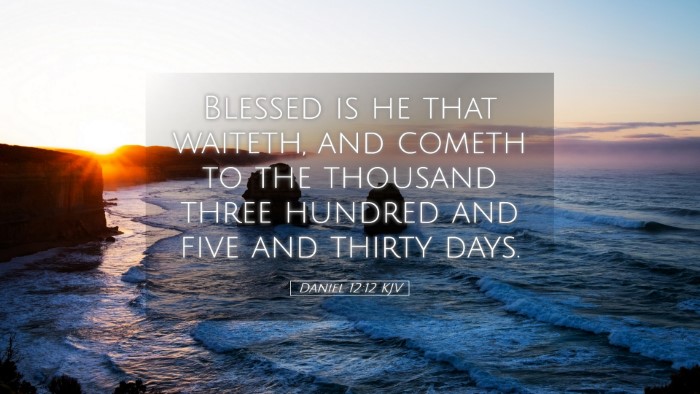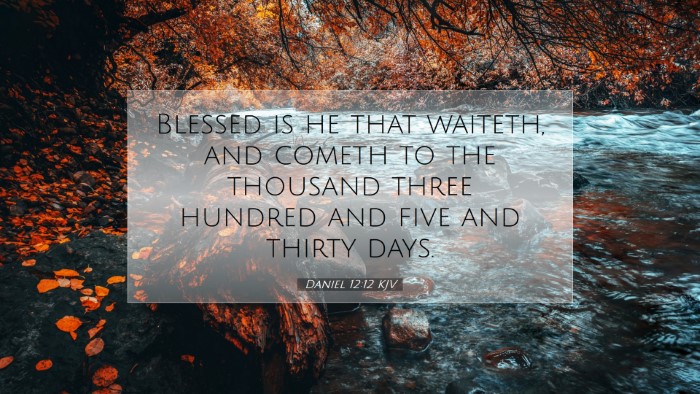Old Testament
Genesis Exodus Leviticus Numbers Deuteronomy Joshua Judges Ruth 1 Samuel 2 Samuel 1 Kings 2 Kings 1 Chronicles 2 Chronicles Ezra Nehemiah Esther Job Psalms Proverbs Ecclesiastes Song of Solomon Isaiah Jeremiah Lamentations Ezekiel Daniel Hosea Joel Amos Obadiah Jonah Micah Nahum Habakkuk Zephaniah Haggai Zechariah MalachiDaniel 12:12
Daniel 12:12 KJV
Blessed is he that waiteth, and cometh to the thousand three hundred and five and thirty days.
Daniel 12:12 Bible Commentary
Commentary on Daniel 12:12
Overview
Daniel 12:12 reads: "Blessed is he who waits and comes to the thousand three hundred and thirty-five days." This verse serves as a concluding remark in the Book of Daniel, offering both a blessing and a challenge to the faithful. The prophetic timetable noted here encapsulates themes of patience, hope, and divine reward.
Exegesis of the Text
This verse appears at a pivotal moment in the prophetic narrative. Daniel receives a vision concerning the end times, a period of tribulation, and the resurrection of the dead. The mention of "thousand three hundred and thirty-five days" implies an extended period of waiting for the fulfillment of God's promises.
Historical Context
Historically, this period can be linked to the trials faced by the Jewish people, especially during the Maccabean revolt against oppressive regimes. Understanding the socio-political context enhances the significance of the waiting period and the ultimate blessing promised to those who endure it.
Theological Implications
From a theological standpoint, waiting is often portrayed in Scripture as a virtue. The beatitude pronounced here highlights God's recognition of faithfulness amidst uncertainty. This correlates with other biblical promises, such as the rewards for perseverance found throughout the New Testament.
Insights from Public Domain Commentaries
Matthew Henry
Matthew Henry, in his commentary, emphasizes the happiness of those who endure patiently through trials. He notes that the numeric representation can be seen as a figure of completion, thus relating to God's sovereign control over time and history. Henry highlights the importance of not just waiting but maintaining one’s faith during this period, indicating that blessings are reserved for those steadfast in their devotion to God.
Albert Barnes
Albert Barnes brings a focus on the prophetic nature of this verse. He interprets the "thousand three hundred and thirty-five days" as symbolic of a specific yet mysterious duration that indicates a time of persecution followed by deliverance. Barnes underscores that the 'blessed' is not merely an acknowledgment of happiness but a broader sense of being favored by God, encouraging believers to persist in their faithfulness even when the outcome seems distant.
Adam Clarke
Adam Clarke approaches this passage with an analytical lens. He discusses the interpretive variations regarding the 1335 days, considering it both a literal and metaphorical countdown leading towards the eschatological fulfillment. Clarke accentuates that this particular verse acts as a promise for those who wait, suggesting that the wearied and oppressed will find solace and joy in God’s ultimate deliverance.
Application for Today's Readers
The themes embedded in Daniel 12:12 resonate powerfully with contemporary audiences. For pastors and theologians, the emphasis on waiting and blessing offers a rich theological landscape. It invites reflection on how the concept of time intersects with faith and divine promise.
- Patience in Faith: Encouragement to embody patience while awaiting God’s promises.
- Understanding Times of Trial: Reflection on the spiritual significance of enduring suffering and strife.
- Assurance of Blessing: A reminder that God's rewards for faithfulness extend beyond earthly trials.
Conclusion
Daniel 12:12 serves as a poignant reminder of the blessedness associated with perseverance and faithfulness. Through the insights of esteemed commentaries, we accrue a deeper understanding of the text's implications historically and theologically. The call to wait faithfully resonates unequivocally as a timeless principle for believers contending with the complexities of life and faith.


